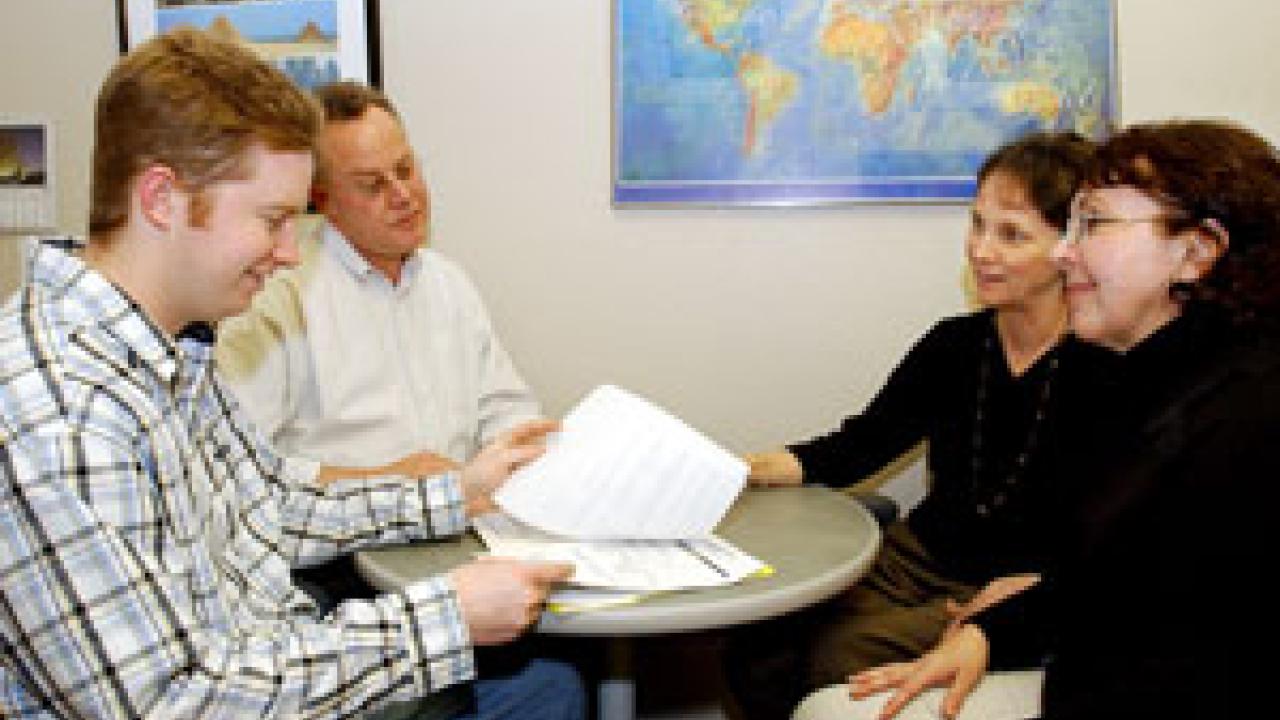UC student demand for the Education Abroad Program continues to increase, despite dramatic events such as the attacks of Sept. 11, 2001, wars in Iraq and Afghanistan, and the outbreak of Severe Acute Respiratory Syndrome.
As UC's only systemwide international academic program, EAP leads the nation in the number of students sent on long-term study abroad. In 2002-03, more than 3,600 UC students studied abroad under the EAP banner, a 27 percent increase over the previous year. An estimated 4,250 students are expected to study abroad this academic year.
Last year, 342 UC Davis students participated in the UC's EAP program, said Peter Schiffman, geology professor and director of the Education Abroad Program at UC Davis. That's an increase from 281 the year before and 219 in 1998-99.
Schiffman said that EAP is engaged in a major initiative toward better academic integration of course work taken during study abroad.
"This entails working with faculty and academic departments and programs on this campus toward the goal of more effectively incorporating EAP course work into degree requirements," he said. "One goal would be to have departments set course equivalencies and create Study Abroad advising templates and post these on their Web sites."
For 2003-04, Schiffman said UC Davis is expanding or creating new program options in Canada, France, Germany, Hungary, Netherlands, Sweden and Thailand. Currently students can study in the United Kingdom, Italy, Spain and Argentina.
Studying abroad is frequently a transformative experience for the students, said Diane Adams, assistant director for the Education Abroad Program on campus.
"It changes their lives. These young people come back with heightened self-confidence and the ability to deal with unknowns while living in a different culture," she said.
The growth of the programs reflects UC Davis' commitment to develop "global perspectives" among students, Adams said, as well as rising student interest itself. "Students are truly committed to having an international experience as part of their educations," said Adams, adding that the United Kingdom program is the most popular on campus.
Another fundamental goal of EAP is to expand the academic reach of each UC campus to the international arena.
UC Davis' Miriam Kaufman, a human development major, studied in Ireland in the 2002-03 school year as part of the EAP. "Studying abroad helped me establish my independence," Kaufman said, "gain a better perspective of the world outside the United States, and more understanding of other cultures and systems."
Marilyn Stotts, a political science and German major, studied in Germany during the same period. "My year abroad in Germany was incredibly advantageous," Stotts said. "My intellectual growth increased and my academic goals grew from sprouts to trees. I bought so many books on so many subjects, and I now read German comfortably."
Stotts said learning a language opens you up to all kinds of people -- "friendly faces on the street and great thinkers on the page -- in their own language."
Aki Inoue, a psychology and Japanese major, studied in Japan last year. "Education abroad not only gave me the opportunity to live and absorb the Japanese society," Inoue said, "but it also enabled me to view the United States in a different perspective. It gave me new insights to what the world has to offer me."
World events drive demand
International events have stimulated student interest in the rest of the world, and they are eager to develop skills that will help them succeed in an increasingly globalized environment, said Scott Cooper, EAP associate director for academic integration. He is an ecology professor at UC Santa Barbara.
Once students travel abroad, Cooper said, they gain more advantages the longer they stay. These advantages include knowledge of the culture, language, and educational systems of a host country; new perspectives on academic subjects; different approaches to intellectual issues or applied problems; and increased sensitivity to foreign views of international issues.
The dearth of such insights and communication skills among Americans has prompted the Association of International Educators to recommend that federal fellowships triple the number of American students who study abroad. The group argued such action is urgently needed to overcome Americans' continuing insularity.
EAP emphasizes semester- and year-long programs. "Because it takes time for students to get through their initial reactions to being in a new country, long-term stays are necessary to maximize the benefits to our students," Cooper said.
Involving faculty
Schiffman said the UC EAP Program currently has openings for Study Center Directorships in Egypt, France, Italy, Japan, Spain and the United Kingdom. Tenured UC faculty, including lecturers with security of employment, and professors emeriti, can apply. The deadline for applications is March 8. For more information on faculty opportunities, see http://eap.ucop.edu/faculty/direct.htm.
The UC Davis Education Abroad Center office also notes that many non-EAP opportunities are available for students who want to go abroad, including the Global and Local Opportunities Beginning with Education program, and study, volunteer, work and teaching opportunities overseas.
Parents are naturally wary of potential health and safety issues. To ensure students are safe, EAP has developed an international network that includes overseas staff, with on-site UC Study Center directors; host university officials; and staff at other study abroad programs.
EAP also consults with U.S. embassies at every site and with monitoring entities including the Centers for Disease Control and Prevention and World Health Organization.
Following Sept. 11, a survey of 170 EAP students overseas found that the program's international partner universities provided extensive emotional and physical support.
Bruce Hanna is director of communications for UC's Education Abroad Program.
